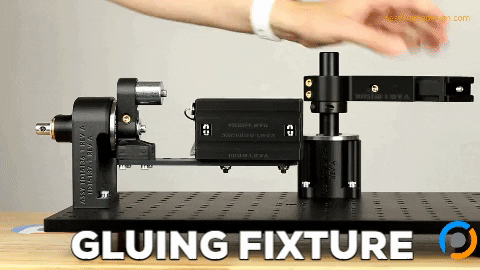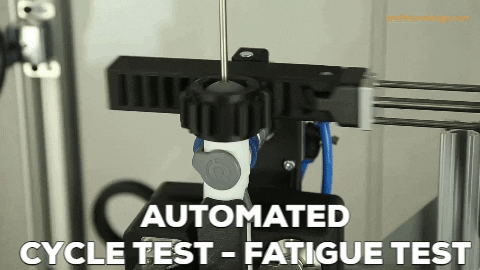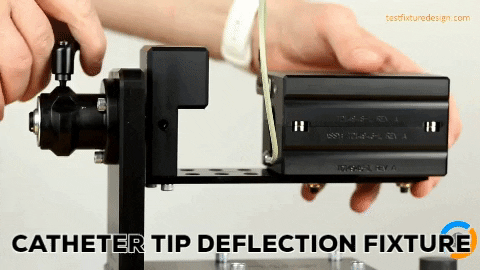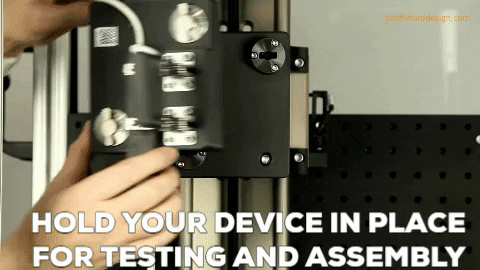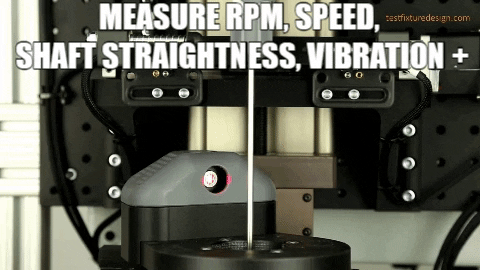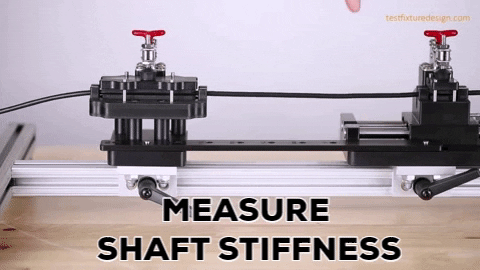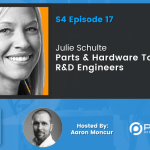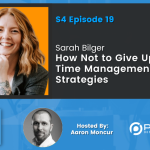Andy Wells | Touching Lives Through Engineering
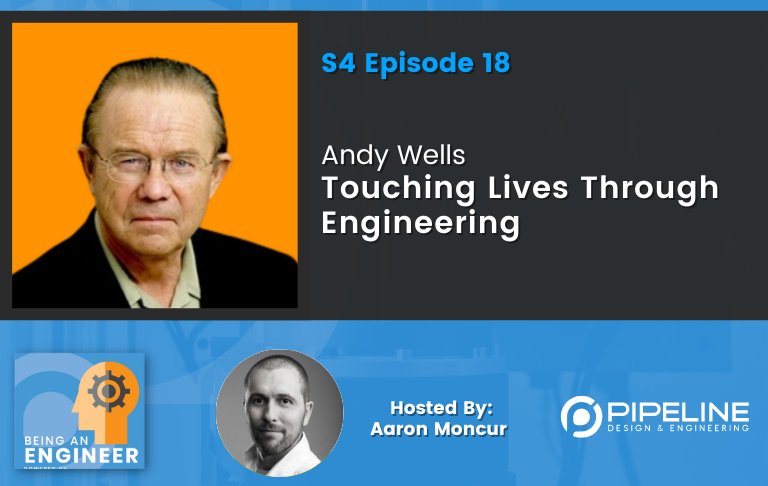
Who is Andy Wells?
This episode is the chicken soup for the soul of engineering. Without doubt, the most inspirational episode we’ve recorded to date as Andy Wells shares with us how he and his company have helped elevate those in poverty and given their lives purpose and success. Along the way, he shares some very practical info about manufacturing tolerances and growing a manufacturing business, as well.
Andy Wells is founder and CEO of Wells Technology, a manufacturing company in Minnesota. Andy has degrees in physics and technology as well as decades of practical experience in design, materials, processes, and entrepreneurship. Over the years Wells Tech has grown from serving the aerospace industry to automotive, medical, defense, food processing, and developed services in distribution, and training for manufacturing technologists.
EXPAND TO VIEW EPISODE TRANSCRIPTION
Presenter 00:00
Hi everyone, we’ve set up this being an engineer podcast as an industry knowledge repository, if you will, we hope it’ll be a tool where engineers can learn about and connect with other companies, technologies, people, resources and opportunities. So make some connections and enjoy the show.
Andy Wells 00:18
Number one, you got to have this deep desire. And number two is you got to be trustworthy. You have to do what you say you’re going to do, you have to be totally honest. Otherwise, your suppliers or your customers, or your employees or whoever you work with, really won’t want to work with you.
Aaron Moncur 00:36
Hello, and welcome to the being an engineer Podcast. Today we’re speaking with Andy Wells, who is the owner and CEO of Wells technology, a manufacturing company in Minnesota. And he has degrees in physics and technology, as well as decades of practical experience in design, materials, processes and entrepreneurship. Over the years, Wells Tech has grown from serving the aerospace industry, to automotive medical, defense, food processing, and developed services and distribution and training for manufacturing technologists. Andy, thank you so much for being with us today.
Andy Wells 01:29
Oh, you’re most welcome. It’s an honor to be here.
Aaron Moncur 01:31
Well, Andy, what what made you decide to enter this field of engineering and, and manufacturing?
Andy Wells 01:38
Oh, I was kind of born into it. Growing up on a very poverty stricken farm on Indian Reservation. And we had a lot of old machinery there’s my dad started farming. Just being a little kid, I hung around with him at first learning how to use tools and then starting to take things apart, you know, the old clocks and stuff like that, that kids can get ahold of sometimes. And it just kind of developed. And as I got a little older, I had the responsibility of running tractors, fixing things. So I kind of learned it just that way. But I was also very curious. And I think it kind of irritated my parents a little bit, took things apart, wanted to know how things would work. I still do a lot of that. Curious about electronics and chemistry and mechanical things. So because of the curiosity and because of my imaginative, creative nature, I come up with a lot of little products. Even when I was quite young that helped our farming operation. And sometimes it’s just toys. So because we like I mentioned, we’re living on a pretty tight budget in our family, the toys are more clothing items, and not so much actually toys when a birthday party or Christmas party came along. So a lot of the toys we had at first were just little blocks of wood and some of the simple things. Gradually, when I had that more ability, it started building go karts and motor scooters, and boats and other mechanical things. So I kind of just kind of grew up being sort of a junior nonformal engineer, but it was the beginning steps to what led to my career.
Aaron Moncur 03:27
That’s wonderful. You mentioned the word creativity, which I hear a lot from from really good engineers. It’s just something that they have innately. Do you think that that creativity? Is that something that can be developed in a person or you either have it or you don’t?
Andy Wells 03:44
Well, I think most people have. And you see the little children until they’re about young teenagers that kind of, I think from peer pressure and maybe just other interests, they kind of move on to more traditional things. But when are young most children are very creative, playing with boxes and so forth. Unfortunately, nowadays, the toy industry has made toys look so realistic. Oftentimes, young people don’t need creativity as much. But still, you know, just just creative. This is probably in most people. I just found it to be so interesting that I just kept it going. And even to this day, I’m creating things and puzzles. Always trying to keep the mind fresh.
Aaron Moncur 04:32
Yeah. When you were growing up, especially when you were younger, maybe I don’t know younger than in your teens. Is there anything you can remember inventing or designing that turned out to be a really great tool or very beneficial to your family and you thought to yourself, I’m actually really good at this. Like I could keep doing this for a long, long time.
Andy Wells 04:55
Well, I was quite young, I noticed you know, there were certain things screws over Phillips has another slot in him. And so he had to have two screwdrivers. So I have made a screwdriver that actually using an old rifle cartridge and took two screwdrivers apart and built this one that you could flip the end of it. I still have it here in my display case, one of my early inventions, I was about seven years old at the time. And of course, now you see him all over at hardware stores and homes where you fold the shake out, you turn it in for and put it back in the handle. But that was one of my earliest inventions that probably if we had known what to do with it might have become a commercial product back then. But you know, he learned all that to inventing is one thing, but manufacturing and marketing and all that is the other part.
Aaron Moncur 05:49
Yeah, absolutely. We’re going through that right now here at my company pipeline, we have just finished developing one, one or two different products of our own. And now we’re trying to figure out okay, how do we sell these things? Now? That’s a whole other ballgame. What, let’s see, growing up on a farm you designed, I mean, all sorts of things, right? Go Karts and homemade rockets and double sided screwdrivers. At some point, you realize that a formal education would would help you take your your capabilities to the next level in terms of turning your concepts into reality. What were a few of the limitations that you encountered designing things back then? And then how did your college education help you overcome those limitations?
Andy Wells 06:41
Well, I was actually, in my late late teens, just turning 21 I left the farm and found a industrial job at a nearby factory that needs snowmobiles, called Polaris industries up here in northern Minnesota. And I happen to be aware of them because they also made straw choppers that went on the backup combined. We had an old combine that had one of those. So I saw the address and the company name and and we had had a poor crop year that year wasn’t much money. So my dad and I talked it over and I said well, rather than stay on the farm, I think maybe I’ll see if I get an industrial job. And I went up to Paris and I brought along a lot of pictures of all the different different toys, I guess I’ll call them, like you said, Go Karts and all that stuff. And showed it to the President. They had only 300 employees back then. But the President had been involved in making the very first snowmobile, here in America. And he was quite a creative person himself. And, and he was really interested, I think, and saw something in me that he really probably felt within himself also the creativeness. So he was about 35 years old. Here I was 20 years old. And so he said, Well, we’ll hire you as an apprentice. And you can work in the engineering department and do drawings. And let’s see, see what happens. So after a couple of weeks, I asked if I could make a new snowmobile design, either making sketches, or one that would actually have the motor in the front, because back then the motors were in the back. And they were big, and they were heavy. And so I made a small one on my design that would be fast and fun and lightweight. And he said that they were short on money, so I’d have to probably couldn’t do that. But they offered to pay for all the materials if I could use their shop at night when there was no normal production going on. And so with that in mind, I volunteered to work. And after about three to four months, I built up the prototype of that first front engine snowmobile for Polaris. And he and of course all the other employees were interested in one of us testing it, that little kids in the neighborhood really enjoyed it, because it was one of their size, me being a smaller person, and it was just naturally a little bit on the smaller size. So they loved it. The President saw that that had a lot of potential. So he invited me out for lunch with in his home actually, I met his wife there and we sat and had to relax noon lunch, and he said, he said, I should go back to school. And he said he had wished he had done that when he was younger. And he said Now’s my chance. And he said I could always come back and work empires, but boy, he said, Go get some science and math and you know, try and you know, learn the kind of technology and things that will help you in the future and he just gave me his friendly advice. So I took it to heart and you know, a couple days later at Hold on, I was going to do that. So I resigned and started pursuing my college education. And actually, you know, it was very good advice, some fun I did. Of course, I learned a lot with the sciences, the maths, the chemistry, the calculus is all the things you take to be, you know, a graduate, diploma, engineer or scientist or whatever you want to call it. And I use, of course, a lot of it, you never know what you’re going to use when you’re going through all those classes is sort of a shotgun approach. They give you all these things, and then hopefully, someone will come in useful. And they did. And the second thing that really helped was when I got into discussions, as a consultant, with big corporations with engineers, they often would, you know, talk about certain things that I would give my opinion, they give theirs, and we always did it in a professional way. But sometimes they would say, Well, you know, are you an engineer? How do you know all this? And I tell them, No, I’m not, not a degreed engineer, but I do have a master’s degree in physics. And, you know, that helped a lot of weight, because a lot of similar classes we had to take, it’s just that in the community, I lived them, there wasn’t a school that offered engineering. And that’s one of the handicaps that sometimes you have, when you grew up in the poverty area, rural area, you know, it’s quite a intimidating thing to go to the big city. And I wanted to stay in small schools. So I, I went to our local four year university. And by the time I finished my physics degree, they had actually put in a master’s programs, I got the five year program, but I’m thankful they were, it was a small school was easy to get a lot of help. And we had a lot of fun, I ended up you know, there to probably taking longer than I should have, because I had to work my way through I had to have a job to to pay for the school, but eventually got done. And I’m thankful I didn’t do that.
Aaron Moncur 12:14
What were a few of the things that you learned at university that did end up being really helpful in your career?
Andy Wells 12:22
Well, I think a lot of the formulas, you know, for, like, you know, pressure, temperature, volume, some of those basic things, I don’t remember all of them exactly, of course, you got mass energy and all those things, but, but I know they exist. And all I have to do is get on the internet and look up, you know, what I want to know, and there the formula is, so I know how to use it, once I see it. It’s just being aware of all these different things, and sometimes processes. And so in meeting other people being around other, you know, engineering science type people, it is good to have that kind of camaraderie to kind of encourage each other. And sometimes I guess I did get a little bit of trouble too, because I ended up building things that probably shouldn’t, you know, I had I had the I was a student helper to there. So I had access to a lab. And, and I knew how to use tools and encouraged them to put in a machine shop. So they got a grant and they let me buy all the equipment for that machine shop. And so I had free access to build things. And one case of one of the chemistry guys was talking about rocket powder. And I said, Well, I can build rockets. I know how to do that. And they kind of challenged me and said, well, let’s build one. So I built the rocket and he furnished the powder and I explained how to mix it with the ratios and all of that and we launched it the horse the school didn’t like that it was sort of an unapproved launch off the top of the science building but when a mile or two and across the lake and landed stuck. Fortunately, it was you know when nobody got hurt or anything but they didn’t want me Do not again
Aaron Moncur 14:19
that’s a great story. Thank you for for sharing that. Well following your your time at university you went on to work in academia and as an industrial consultant for about 20 years or so if I found the numbers right then sometime in the second half of the 80s I believe he founded wells technology originally an aerospace manufacturing business. Starting a business can be a scary proposition. I know that from experience. What what are some things that you did in the beginning of wells tech to reduce reduce risk to you and the company
Andy Wells 14:59
I’m Well, it’s it’s a big step going from being an employee to being an entrepreneur. It’s in many ways, what is it takes a lot of time, you know, you have to be really devoted, you just got to have a deep, deep desire to do that, to be your own boss. Because it’s going to take a lot of time and a lot of sacrifice from your family as much as from yourself. They have to realize that you’re not going to be there a lot of times for birthday parties and for little family things that they sometimes you know, used to have you around for, you’re going to be working often late, maybe traveling. And you’re going to have a lot of things on your mind. So my family had to understand that and they did. My wife was a great supporter all the way through, she believed that I could do it. And when I resigned, I was a university professor. And when I resigned, people said, You’re crazy. You got a tenure job, you know, it’s a great job. And it was, and I work four days a week, and I have Friday off and do consulting for large corporations, and it was great. But there was something inside, you know, that just felt I needed to have my own business. And I believed I could do it. And I was willing to learn from every experience I had, I didn’t know all the answers, but I was willing to try and try and try until I found them. And we didn’t make a lot of mistakes. But we made a lot of things that went right to and built upon those. And I was fortunate, my five year old son was interested also in this and he began to follow along with what I was doing. And he helped me in many ways. So we had $1,300 When we started because teachers, you know, don’t make a whole lot of money. But I was a teacher because I believed in sharing things with people sharing knowledge, and experiences and things. So I enjoyed teaching. But it was time now to teach my son and so I get him involved, we both learn at the same time. And we built up our company from $1,300 It took us a while to find a product we bought an old milling machine. And I tried different products I tried to lung shaped ashtray snaps to go on your shoes, you don’t have to tie the laces, I still wear them. And all kinds of little things. And finally, we came up by written a paper the people in the chicken industry were getting carpal tunnel, and having sore hands from using scissors. So went to work designing and building air powered scissors, and then air power knives. And those things really caught on a really started selling. And so we borrowed a lot of money too much as much as we could to get patents on those. And I did the first patent myself, because I didn’t have money for but later on, I showed up to a lawyer and he said, you know, you really, you really need to get help. He said patterns are so specialized that instead of spending all your time trying to learn that it’s kind of like doing your own income taxes, when you’re in business, you’re better off spending your time creating new products, and let us do the patterns you said. And so we worked out that arrangement. And, and it turned out to be a great product with scissors. And still so we still manufacture and you need eventually you need something like that when you’re an entrepreneur to kind of really get you go on other ways you struggling, struggling, going eventually, you know if you can hang on financially, you know, it just wears you down mentally from all the stress. But after about eight or nine months, we begin selling our products and we can have some positive cash flow. And that’s where having grown up in a poverty family, both my wife and I did you know, we knew how to live very frugal. And so we made it through, okay. And it’s interestingly enough, our life has never really changed and we still live that much. We pretty much you know, you kind of grew up a certain way. And you know, I just still so like that. I don’t stay in the most expensive hotels, even if I could afford them. You know, you just kind of get a certain way of life, even when you have success. So I appreciate having been in poverty when I was young because I really know. You know, I’m thankful for being able to go to a nice restaurant if I want to have a nice office or travel if you want to. It gives you a real appreciation when you’ve come from poverty to sort of like if you’ve had a lot of rain you appreciate the sunshine. Yeah, right. Yeah, you know, so So the business took off and we kept adding more ideas and Are things. And the one thing that’s really two things maybe that are really critical for an entrepreneur, or person wanting to start is, number one, you got to have this deep desire. And number two is you got to be trustworthy, you have to do what you say you’re going to do, you have to be totally honest. Otherwise, your suppliers or your customers, or your employees, or whoever you work with, really won’t want to work with you. And it takes a while marketing is very difficult. So you have to be willing to struggle for a while. And it can take 10 years to get your foot in the door and sometimes in a big company. And the reason is, there’s so many people trying. And oftentimes big companies look at a little company and say, well, we don’t want to add more little companies, because now we got more addresses, we got more purchasing challenges, we’d rather have the companies that exist, expand their product line. So it takes a while to get your foot in the door. But if you keep trying and keep trying, you know, quite often you can succeed. And it actually works in reverse. When I have employees come here, I had one young fella come last summer, he was about 17 years old. He was a junior in high school. And he kept showing up every morning at my place, and he wanted a job. And he didn’t have any skills yet, you know, industrial skills or training. So at first I said, well, not right now. We don’t need anything. And next stage shop again and shop again. And finally I said, Can you run a lot more? And he said, Yeah. And I said, Well, I got a lot more here. You know, it’s a riding lawnmower. And I’ll show you a little bit of audit, if you want to give it a try. Let’s see how it goes. He did he did fantastic. You know, he loved it. Good attitude. And that’s what perseverance, you know, whether you’re an employee or you’re an entrepreneur, you just got to keep trying, keep trying. And in a pleasant, polite and patient way. And eventually, a lot of times you can succeed. Wow, so
Aaron Moncur 22:05
many wonderful nuggets of wisdom here, Andy, I will almost don’t even know what direction to go with all of this. With all this this amazing advice that you’ve been giving? One question I have is specifically about a manufacturing company. For those listening who might be interested in starting their own business. In manufacturing. Of course, there are a lot of general principles and pieces of advice that could be given about starting a business, but specifically starting a manufacturing business, any any pearls of wisdom that you can share.
Andy Wells 22:42
Yeah, well be willing to do sometimes things free. We’ve done a lot of prototypes, a lot of first, models are first samples, we do it we’ve done them free. And sometimes when you get known a little bit better, you can charge an engineering charge, or you can charge a prototype charge. But you know, we were willing to do it and prove to people that we are capability and we can do things fast. There were many times in my first year when we would my son and I would work all weekend and we take turns running the machine day and night, he worked for hours, and I worked for hours. And then we get our samples made up. Sometimes we had companies call us Friday afternoon. And they’d say they got to certain parts that they ran out of they need six more in the company that normally make some is shut down for the weekend. Is there any way we could get them six of those parts? And I’ll tell him, yeah, if you can fax me or email me, I’ll print the drawing. I’ll make those parts for you this weekend. And I’ll put them on an airplane Sunday night. And you’ll have it Monday morning. And so we’d have a courier pick it up on the other end and deliberate eight o’clock in the morning to the customer. And we do this many, many times. And sometimes my son or I would drive ourselves, you know, four or 500 miles to deliver a part or a box of parts. And we just went extraordinary distances in terms of helping customers to earn a reputation. And even today, when we make let’s say we’re making 1000 parts of some item for customer, all right, maybe 15 or 20 extra, just put them in a little inventory and carry them for a year or two. You know, when our machines set up anyway, in his running these parts, maybe one or two minutes apiece, it doesn’t take long to make a few extra ones and put them in a drawer and put them away. Quite often the company who was making her needing these 1000 parts will discover that they were actually short a few not that weakness counted but maybe some got damaged during installation. Or maybe some got dropped and loss. Anyway they need three or four parts more, they call us up and say, by chance, do we have any extras? I’ll say, Yeah, we got plenty of them here. And it’s, oh my goodness, what would it cost us to get those and I said, I’ll send them to you tomorrow, no charge, you can have free. Just remember us next time you need some. And this has built a lot of good customer relations through the years. So now when I go to trade shows, and of course, I’m always trying to find new customers, but a lot of the old customers show up and we shake hands, and they thank us for taking good care of them. And I tell them, we’re here when you need us, you know, and if we can do it, and we say, we can do it, you can count on us, we will do it, we just do it, follow this thing called integrity. You know, your word has to mean something. And if you say something, then you really need to do it, so that they begin to believe in you.
Aaron Moncur 25:49
Again, just so many pearls of wisdom here incredible advice. hard earned, I’m sure over all the years, I’m going to take a very short break here and share with the listeners that Team pipeline.us is where you can learn more about how we help medical device and other product engineering or manufacturing teams, develop turnkey equipment, custom fixtures and automated machines to characterize inspect, assemble, manufacture and perform verification testing on your devices. Today, we’re speaking with Andy wells, CEO at Wells technology. So when when you first started wells technology, and the you had this product, these pneumatic shears, and you were also doing job shop work, basically, is that right? The combination of those two things?
Andy Wells 26:41
Yes, yes, that is we started that way and the shares were growing. And I sold the patents for those, so I could get some money to buy the CNC equipment, that equipment is so expensive, we had to have, you know, like 200 $300,000 to buy a machine and efforts, the banks wouldn’t loan us any money. Because we only had $1,300 for a down payment. And we were new. And, you know, they were worried that they wouldn’t make it because truthfully, a lot of businesses don’t make it the first five years, I think about half of them fail. So, you know, understandably, they were a little bit concerned. But as we started selling her shares, and we started building our reputation, they began to take an interest, but they weren’t gonna borrow us the 200 or 300,000, they said, Well, maybe 50,000. So I had to sell some of my patterns. And fortunately, I found the buyers for them for tools. And we got enough money to buy our first CNC machine. And from that, you know, our production just really increased in both quantity and quality. So it was easy to hold the tolerances that aerospace demanded. And there again, they would send us the parts where they were in trouble and couldn’t get things quickly. That’s when we would get, you know, discovered. And I would go to trade shows. And I think that’s really important. Because if there’s one thing that new entrepreneurs often underestimate is probably how much work and expensive marketing is. You have to spend a lot of time a lot of work a lot of money. And it’s hard to really know what’s working, you know, you can put an ad in a magazine or you go to a trade show, but it’s hard to really know if that’s paying off. It takes a while to kind of figure out what what your thing is in terms of marketing is successful. We kept on trying all kinds of things. And eventually people would discover us. And then when they got in trouble, you know, somebody didn’t come through with the right product quantity or whatever they call us up because that’s I told him to do that. I said, we’re here when you need us. And so they call us up and say sure, you know we’ll do this. And I’d give them an estimation of time and costs. And we never took advantage of them and I still go if I had to pay overtime outsell them that’s I’m look I gotta keep my employees over the weekend. I’ll have to pay him maybe time and a half or double time if it’s a holiday but I said if you’re willing to do that we can do this for you. And they almost always were but we never got carried away with the extra charges. I don’t like it when people do that to me and I don’t do it other people. In fact, we go the other way. We try to be really good to our suppliers. I know a lot of them are struggling too. So I don’t beat them down and cost. You know I tell them to give me a fair price and I’ll buy these tools or these machines or whatever from you. But give me a fair price. And I said, but I’m going to pay you in 10 days. Now a lot of places we don’t get paid in 10 days, we get paid. Oftentimes, it’s 90 days or even 120. So, it’s a struggle if you’re a little company. And that’s happening because you got to carry that cash flow. So you have to be able to do that, because that’s going to be the trend, it used to be 30, then it was 60. And now it’s getting to be 90 and 120. And these companies that do this, call it using other people’s money, OPM, but for us little companies, it’s kind of tough when you first start out, so I don’t do that to suppliers, I pay them in 10 days. And, you know, that helps. I know, the business schools say, oh, no, you shouldn’t do that. But it helps us because when we need a favor, for example, if I’m going to one of the bigger cities to pick up metal, and I’ve got a truck down there, and I need it right away for emergency in this big company, this big distribution company may say, Well, we got a 24 hour turnaround, we can just take a phone call and pull metal off our racks and put it on the truck you got coming in. So I tell them, Look, if the company has been paying you in 10 days or less, for a number of years, so we do what we can to help you and I’m asking you to help us. And you do that. And almost always they’ll say, Okay, we’ll do it for you. So that’s terrific. So if you go out of your way to help other people, they will go out of their way to help you. And I say the same thing about a smile, you get a smile, walk down the street, smiling at people, the smiles come back, it’s the same with kindness and goodness and help you get with other people, it comes back to you, you treat people fairly, they’ll treat you fairly, you’d be honest with people, they’ll be honest with you. And I work with a lot of people here who sometimes failed in the public systems. Some of you even come out of prison. And people say, Well, how do you dare do that? Or what kind of work do you get? So they get terrific work. They’re excellent employees. They’re great. And I’ve set my standards high, I tell them what I expect. But I live by those standards too. For example, we have a policy, you can’t use your cell phone in the shops, unless it’s an emergency call. I know some of them got children, so on. And I said no, if your wife is stuck in the ditch on her way to work, you know, that’s okay, she can call you and you can go and help her up, or your kids are sick, you got to go pick them up, that’s okay. But you can’t be playing games, you can’t be talking with your buddies about deer hunting. So that’s work time you do that other stuff during coffee time. But I’m the same way I can’t do that either. You know, you got to walk your talk. And when you’re a business leader, so once a week, I go out there and I talk to your employees, I talk positive. We have a policy here that I try to catch people doing things, right, wrong, catch them doing things right. And I like to give them a compliment doesn’t have to be long, just in less than a minute. How am I appreciate what they did, and you know, the workstation looks clean or, or you know, the floors nice and clean. I really liked that around as safe. Just little things, you know, people like appreciation. And we all do. And you know, just a few words from from an entrepreneur from the leader, the manager, supervisor, just a few words really can brighten their day. And so I try to do that, especially in the mornings when they come in, you know, they may be kind of tired, or they kind of have a tough time meeting their bills, and so on. But a little word of appreciation really goes a long way in helping them brighten their day. So we do that. So I’m kind of straying off your question here. But
Aaron Moncur 33:41
now this is wonderful. And yeah, I think I feel like I could just sit and listen to talk all day. This is I don’t love the term masterclass, because I feel like it’s so cliche and overused. But I can’t think of a better word to use right now than a masterclass and empathy and business and entrepreneurship and leadership and you know, all of these things that we all strive for. So I just really appreciate you sharing all of this with me. I do have a more of a technical question about design for manufacturing with all of the decades of experience that you have in the world of manufacturing, maybe you can shed some light or share some some some strategies here. A lot of engineers unfortunately don’t necessarily have the opportunity to gain experience in manufacturing. They’ve never worked on shop floor. They’ve never run a mill or a lathe or CNC machine. And and because of that they’re understandably somewhat ignorant in in DFM principles design for manufacturability. Kind of the classic example here is putting square internal corners in a part that needs to be machined on a mill, which of course is impossible because you can’t cut a square or internal corner with a round cutter? Are there any maybe less trivial examples that that you can share of mistakes or design choices that engineers make that that complicate manufacturing?
Andy Wells 35:14
Yeah, what we see is small phillips welding fellows, you know, sometimes though, specify a really small radius on a felon, well, the arc welding and even gas welding, it’s not always easy to do that it can be done, but it drives the cost way up. And so a lot of the stuff that they might ask for can be done. But my question is, Is it really necessary? Is it really needed? So my advice to engineers, if they don’t know the processes is to be humble? You know, don’t let your ego get in the way have some good sense. Be humble. And when you call a supplier or potential supplier, say, hey, look, you know, this is the design we’re trying to achieve. Here’s our beginning sketches or drafts, or our beginning prints, engineering prints. If you see something on there as a supplier, would you talk with us about it that or we can save some costs. And where we can do things a little bit, maybe faster, easier, cheaper, better? Talk to us about that. And we come across that quite often. Now we have engineers doing that with us. And, you know, we look at things and we say, look, here’s a couple of choices, if you could remove the tolerance a little bit on this one, we could save you 3% On your costs, things like that are just many, many little ways. So be willing to work with the people who are making your parts, because they know their business, just as you know your business as an engineer in your area. But, you know, be open minded, and let them talk with you ask questions, because some places, if you can give a little bit on your design, they could probably save you maybe five, maybe even 10%. And quite often we see this on tolerances, a new engineer coming out of fresh out of school, we’ll put a real tight tolerances thinking this is going to be a great thing, we’re going to have an excellent Park Well, yeah, the park, it’ll be excellent, but it’ll also be expensive. And maybe it doesn’t have to be quite that excellent that performance function, you don’t need a 1,000th of an inch tolerance, or five, you know, a window of five would be fine. There are some products that just don’t require close tolerances, making wheelchairs, for example, most parts on a wheelchair don’t require five thousandths of an inch tolerance, your bending pipe, you know, it could be probably plus or minus 10 or 15 1000s, you’d be just fine, you’re gonna weld it on handled somewhere or you know, or maybe a little break on the wheels summer. If you got bearings and shafts, that’s a little different. Especially if you’ve got things like valve lifters where you got, you know, male and female parts, we make those things here up to just a few millionths of an inch tolerance between the male and female. It can be done, but I’ll tell you, it’s expensive when you get into that kind of things. So, so as a new engineer, designing something, you know, work with your people who are going to actually produce it. And don’t just throw the product over the fence as we used to say, into the production area and expect them to come back with what you want with a good price, because you’ll probably get something back. But it could be less costly if you work with them. And we do that a lot with practice. We have several customers who are making prototypes. And I can see where they’re going with their design what they want to achieve. And after one or two efforts, I’ll sometimes make a third or fourth prototype ahead of time for them. But I’m very careful with how I present it to them. I’ll say well, I’ve seen what your first one looked like in his second one. And logically, this might be something you’d want to consider just look at it with an open mind, throw it away, if you don’t like it. Let’s see if it is something along the lines of your thinking. And I really want them to have their fingerprints as their project. I don’t want to take away any of the, you know, the glory that goes with designing of it. But if I can help with some little idea that takes them a little further. I’m glad to share it in a humble way with them. So you know, so we not only make parts, but we try to help design part two. And we’re really a team is a whole group of people, from the suppliers, the manufacturer, the designers, you know, the assembly people, the sales, marketing people, it’s all of us together. And actually we get a lot of good ideas from the marketing people. They tell us what customers say, and often it doesn’t end which is marketing. You got the service afterwards, and sometimes the lawsuits, you know, the lawsuits are going to follow if you haven’t made your product properly or designed it properly. And then you got to deal with that in court, which is very expensive. And so you have to be kind of really careful. And of course, there is the final step of disposing of it. Things like solar panels and batteries, they’re going to have to deal with all that coming up in the future. So, you know, so your product is going to follow you for a while. So there’s a lot to this design thing.
Aaron Moncur 40:31
I’d love to go back to the topic of tolerances really quickly, because that’s actually a conversation that we had internally, here at Pipeline, there was some debate about what level of default tolerance is not going to drive the cost up. And, and just to build some context around this, let’s assume that we’re talking about a CNC part, we’re probably milling this thing. And it’s maybe six or seven inch long part or up to you know, it’s not a really, really big part, small to medium sized parts we’ve used plus or minus five thousandths of an inch is our default title block tolerance in our drawings for a long time. And one of our project leads here suggested that, you know, maybe we can go a little tighter than that without increasing cost. What What would you say is kind of like the default tolerance, it’s not good to increase cost,
Andy Wells 41:31
I would say depends on the level of your machines and your skill of your operators. When we first started out even 10 years ago, going from a five tolerance, plus or minus to a plus or minus, let’s say, two would probably have increased the cost maybe eight or 10%. Because it would have been a little bit of a stretch for our machines. And, and same with our employees. But in the past 10 years, we and of course a lot of other companies have bought new equipment, much higher precision equipment, or people have not got 10 years more experience. So holding a 2000s is just normal daily operation. Now it’s easy. And if you said you’re gonna change from five to two for us say, well, it wouldn’t make any difference to us, we’re going to run it probably one anyway, one plus or minus one is our machines are capable of it, an operator would have to be really sort of neglecting his his tooling to let it were so much that we get beyond two or 3000s. We use a lot of I call them histograms, or we plot the wear on tools, frequently, and we can see when they start through were in need correction, you know, or I will say sharpening but replacement. But now, but now, you know, actually, the challenge for us isn’t, that level is more, we do probably 30 or 40% of our work in 110 1000 with a window of one plus or minus 110 1000, we can go down to 10 millionths of an inch plus or minus 10 millions. But you know, the cost there is much higher. But 1/10 A probably if you went from 1000 to one tense, you probably double the price, something in that order. And there are some parts that require it, you know, if you’re getting into really tight valves, like hydraulic valves and so forth. But right away, we talk with our customers, and you know, finders and say, What are you trying to do here? What’s practical, you know, you know, and they’re almost always concerned about price too. And we tell them, you know, here’s what we can do for you. And still prices a concern, I say, Well, okay, let’s talk about quantity, then can we increase the quantity and keep the price down for you. So we’re always trying to work with quality, price delivery. And then the fourth thing, of course, is just being friendly, just being easy to work with. Because I don’t care what the price and quality and delivery are. If you got a really miserable person on the other end of the phone, you know, is your supplier, you just don’t want to work with them if you don’t have to. So if you got someone who’s really pleasant, nice and understanding that goes a long way to go along with all the other things you’d expect from a supplier.
Aaron Moncur 44:27
Yeah, that makes a huge difference. But by let’s see, early 2000s 2004. So wells technology had grown to more than just manufacturing and you had you know, enjoyed some measure of pretty good success with your business by then, and decided it was time to give back. And at that time you you started a social engineering project to train some folks and you alluded to this earlier in our conversation, who needed call it a second chance in life. Can you tell us a lot little bit about that program and how it’s grown over the years.
Andy Wells 45:03
Yeah, it kind of kind of began to evolve. As we were growing, we needed operators and, you know, engineering people here, technicians. So far, they’re very hard to find up in this part of our country, because we’re pretty remote. And I think a lot of the younger people, especially who want to go to trade schools and universities, they tend to go into the bigger cities. So up here in this remote part, we don’t have much opportunity to hire those people. What we do have coming to our door is a lot of people who probably, like I said, need a second chance they’ve dropped out of high school, our high school failure rate in this community is very high as well over 50%. Because we have a lot of people who grew up in poverty families, sometimes there’s a lot of dysfunction, and the kids don’t get the support they need. So they don’t, you know, do their homework, they don’t even want to attend school. And they struggle, and they come to us later in their life. Wondering if they could find a job. And, you know, I used to say, no, sorry, especially those that had felonies, because they had the check on their application. And, like a lot of places, I mean, even all over America, I think you find everything for fast food, industry and government, people don’t want to hire those who’ve had a felony. And some of these young folks especially get a felony for things that, you know, really end up ruining their life, you know, maybe got caught with some drugs, or maybe they stole a car or something because they were just hanging out, they dropped out of school didn’t know what to do, or didn’t have the right supervision, maybe when they were young, I can’t say I really blame the young people, because they kind of are what we as adults have led them to be and the environment we put them in. They of course have their own personal talents and their personal motivation, but, but a lot of what they are is a result of what we have exposed them to. And so if they’ve haven’t had proper training, and so forth, when they were young and discipline, they can do things that ended up causing them to get a felony that it’s, I’m not saying that the threatened anybody’s life, but they did something that broke the law. And now they got this hanging over their head, and people don’t want to hire him. And they came here and I thought, one day one follow up came in. I said, Well, I’m sorry, he was so pleasant than he shook hands with me. And he said, I’ve been trying for six months, he said, I just can’t find anything. And he ended he thanked me for talking with him. And he went out the door. And when he went back to his car, I looked out there, you know, I could see a lady. And I could see two little kids in there. And I thought, how would I feel went back to my family. You know, when I’m in the state. And I’m trying to trying to correct somebody who won’t give me a second chance. So I went outside, he was just gotten in his car, and I just tapped on the roof a little video opened his window. And I said, will you come back on Monday. And I’d like to take you on the shop and walk around and see if you think this is the kind of work you’d like to do. Of course, he smiled and his his lady was his wife or girlfriend. But anyway, she was smiling. They were happy. Finally, they had a chance when he did come back. And he spent several years with us. And I found out that, you know, I used to teach some of the best and brightest at the university. But I could teach these folks to these smart people are smart. It’s just that they had made a mistake, all they needed was a second chance somebody to help them. And so I started teaching them how to do the things we do in the shop everything from strip on the floors to running the machines and setting him up with tooling and even getting into the programming by about the third or fourth year of writing the CNC programs. And these folks are very capable of learning that then they were so loyal because they appreciate it so much that somebody finally it helped them. And one time I had a company representative from a big company come here. And I mentioned to them that I said well, some of these folks, you know, they they’ve had they have has little bad experiences in their life, but they’re going to disagree. And he said You mean you hire them when they’ve had a felony? And I said, Yeah, I do. I do mean that. And he says, he kind of looked at me and I said, Well, where would you rather meet them? Would you rather meet him here? You know, when they’re in training and they got a job and they got an income and they were appreciating their part Have a team for production? Or would you rather meet them out on the street? But nobody will give them a chance? And they got nothing? Except to steal or sell drugs or something like that? Or would you rather meet him and the guy kind of smile?
Aaron Moncur 50:15
It’s kind of hard to argue with that logic, isn’t it?
Andy Wells 50:18
You know, it got us started. And so far, we helped 105. And, actually, we got two more coming out in about two weeks out of our program. Now, we went one step further, because a lot of the folks had transportation problems. They had lost your driver’s license, they didn’t have any money for a car. And they had a couple of them who couldn’t even read an instruction manual to get a driver’s license, they were like 2122 years old. So we decided to take our program right into a poverty area. And so we loaded up about a million dollars for the equipment production equipment, and move it into a poverty area, I went, I worked with the leaders of that area, to make sure to be okay with them. And they found a warehouse, it was insulated. It was a newer one. So it was fairly modern, they had the lights in the water, and so forth. And we put our equipment in there, and we started advertising, well, we had all kinds of people show up. And I offered to pay him, you know, $15 an hour minimum wage, to take training. So they had something to live on. And so a lot of them so close, they could walk through our training center. And we put one of the teachers in who are one of our best employees who to be a teacher who had come from that area. So he knew the culture, he knew that people and you know, they would feel comfortable with them. So we ran this program for six months, and it was very successful. And those people after six months, they came to our main factory. And they began here as apprentices. And we kept moving up challenging them, you know, increasing their pay a little bit at a time as they progress. And we’ve got quite a few, I think, no, our population is around 32, or 33% of our employees came from a type of a background. And they’re doing very well. They’re very loyal, they’re very good. I got one lady author, I just talked to her maybe an hour or two ago, she’s running our most complex machine, it’s a brand new one we paid $400,000 for it just came in about a month ago. And here she is setting it up and running one of the first parts, we run it in the you know, she came out of this kind of a background, very smart, just need someone to help her out. And she’s supporting five children with money that she earns from us. And so now we’re gonna send her I told her this afternoon, I said, you know, I was invited to go to a big corporation to get an award, I said, I’m gonna have you travel, and I’m gonna send you along with our lady who’s the Quality Assurance Manager. Because this this young girl helping or like she’s, you know, the mother has never flown on an aeroplane she didn’t, she looked kind of scared. She said, I don’t know what to do, I don’t know how to get through an airport. And that’s the goal, we’re going to have someone with you, she’ll take care of the rental cars and all that. And so my quality control manager is going to go with her. But when the work comes, they’re going to pull up on stage again it because we’re so proud of her. And this is really, you know, when it’s all said and done. Being an engineer really is just making life better for other people. And we do that each in our own way.
Aaron Moncur 53:52
I love that so much. Before this interview you had written to me in life, I’m quoting you now, in life I have found engineering is more than just science, applying technology or controlling our environment. Engineering as a way of life for helping people find happiness through development of a better character, visualization of goals, development of strategies, utilization of resources, actions for achievement and feedback for wisdom. And I read that and I thought to myself, Wow, that’s that’s such an amazing statement. It aligns very well with with I couldn’t have put it that well. But it resonated with me very deeply. So I just am so grateful that you were willing to spend some time and share your stories and an experience with us. I think that you’ve already answered this question in a few different ways. But but I’m going to ask this specifically and you can share your take on it. What what is One thing within the context of your role as an engineer, scientist, manufacturing technologist, whatever you want to call it, what’s one thing within the context of that role that that brings you joy? And one thing that that frustrates you?
Andy Wells 55:17
Oh, well, maybe I’ll answer them in reverse questions, we end up on a good note. The frustrating part maybe is just being patient. You know, sometimes I feel I know the answer, or I want to get a project done. And there are reasons why you can’t, and maybe it’s shipping, you can’t get your supplies, or maybe it’s a weekend, you can’t get anybody to work. Or maybe it’s a team and others just don’t understand, and they want to keep discussing it. There’s all kinds of reasons and you just have to be patient. And realize that sometimes like baking a cake, it takes a little while you can make the battery put in the oven, but you got to wait a while for it to rise. And same with ideas, you can plant an idea. And you can encourage it. But sometimes you gotta wait a while for it to incubate and to grow and finally catch on. And, you know, that’s kind of where our program is, when I first started helping people. Some of our regular employees said, Oh, you’re wasting our money, you’re wasting our time. And why do you do this, and let’s just get production out the door. And, and I said, you know, you got to, you got to think about other people. You know, some of us have been fortunate. But not that everybody’s had that kind of background or have been born with that kind of talents. And, you know, we’re all brothers and sisters, and we need to help each other. And that’s, that’s where you find the real happiness in life, that’s the joy is helping somebody have a better day. Because of something you design something you build off or something you’re doing. They say we’re never as tall as when we bend over to help somebody out. And I still think that’s a good philosophy, to stay humble. No matter how clever and smart or educated we think we are really just just people. And you know, we got to remember Be humble. Others appreciate.
Aaron Moncur 57:15
Well, Andy, I was so excited to have you on the show, because of the lessons that I thought myself and those listening would learn about manufacturing. And I think we certainly received that. But I think I can say without hesitation that this has been the most uplifting episode that I’ve recorded, and I just feel like I’ve learned so much more than just manufacturing and engineering. So thank you so much again for being on the show and sharing some of your background and experiences and wisdom with us. I deeply appreciate it.
Andy Wells 57:53
Thank you for the opportunity.
Aaron Moncur 57:59
I’m Aaron Moncur, founder of pipeline design and engineering. If you liked what you heard today, please share the episode. To learn how your team can leverage our team’s expertise developing turnkey equipment, custom fixtures and automated machines and with product design, visit us at Teampipeline.us. Thanks for listening
We hope you enjoyed this episode of the Being an Engineer Podcast.
Help us rank as the #1 engineering podcast on Apple and Spotify by leaving a review for us.
You can find us under the category: mechanical engineering podcast on Apple Podcasts.
Being an Engineer podcast is a go-to resource and podcast for engineering students on Spotify, too.
Aaron Moncur loves hearing from his listeners, so feel free to email us, connect on Facebook, Twitter, Instagram, and subscribe on Apple Podcast and Spotify!
About Being An Engineer
The Being An Engineer podcast is a repository for industry knowledge and a tool through which engineers learn about and connect with relevant companies, technologies, people resources, and opportunities. We feature successful mechanical engineers and interview engineers who are passionate about their work and who made a great impact on the engineering community.
The Being An Engineer podcast is brought to you by Pipeline Design & Engineering. Pipeline partners with medical & other device engineering teams who need turnkey equipment such as cycle test machines, custom test fixtures, automation equipment, assembly jigs, inspection stations and more. You can find us on the web at www.teampipeline.us





